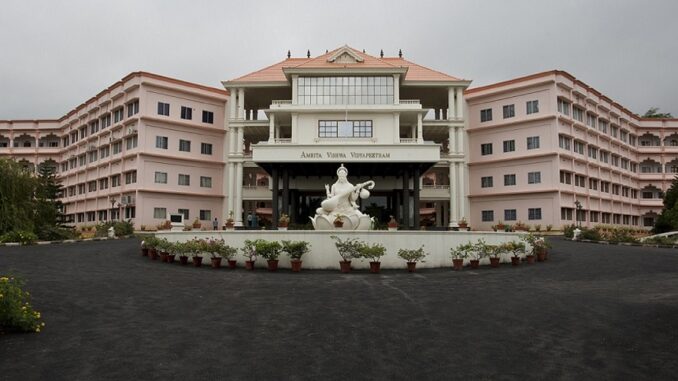
Hyderabad: Amrita Vishwa Vidyapeetham, ranked 4th best overall university in India by NIRF 2020, organized a virtual two-day international symposium on Universities-SDG Performance & Ranking on August 3-4, 2021. Thought leaders in higher education and industry took part in meaningful discussions on SDGs in context of on-ground research, university strategies, funding perspectives, Government policies, and ranking impacts. Shri Amitabh Kant IAS, CEO, NITI Aayog and Professor Anil D. Sahasrabudhe, Chairman, AICTE, were keynote speakers.
The Sustainable Development Goals (SDG) also known as Global Goals were adopted by the UN in 2015. These are the blueprint to achieve a better and more sustainable future for all where universities are key to the adoption and fulfilment of these SDGs
Speaking at the event, Professor Raghu Raman, Director, Rankings & Accreditation, Amrita Vishwa Vidyapeetham said: “The inspiration for this international symposium comes from Chancellor Mata Amritanandamayi Devi (Amma). The New Education Policy (NEP) 2020 announced by Prime Minister Narendra Modi had a focus on SDG4. It believes that free, equitable, and quality education while building on the country’s traditional value systems forms the basis for sustainable development. For the first time since the adoption of SDGs in 2015, the global average of the SDG Index score for 2020 has decreased from the previous year. The decline driven by the decreased poverty rates and unemployment following the outbreak of the COVID-19. Against this backdrop, out discussion, sharing of ideas on SDG performance by universities is significant.”
The highlight of the symposium was the presence of six women educational leaders in India, which is a rarity. Besides this, 23 speakers from nine countries including India shared their best practices. The speakers included Professor Sasmitarani Samanta, Pro-vice-chancellor, KIIT University; Professor Satheesh Kumar Bhandary, Vice-chancellor, NITTE University; Professor Bhavani Rao UNESCO Chair, Amrita Vishwa Vidyapeetham; Professor Bipin Nair, Dean, School of Biotechnology, Amrita Vishwa Vidyapeetham; Professor T. G. Sitharam, Director, IIT Guwahati, India; Professor Madhu Chitkara, Pro-chancellor, Chitkara University; Professor Asis Kumar Chattopadhyay; Pro-vice-chancellor, University of Calcutta, Professor Maneesha V. Ramesh, UNESCO Chair, Amrita Vishwa Vidyapeetham; and Professor B. Suresh Prochancellor, JSS Academy of Higher Education.
According to Shri Amitabh Kant, IAS, CEO, NITI Aayog, the new NEP 2020 has revitalized the education system and with greater autonomy higher education sector must focus on increasing research output aligned with SDG goals. “It is time that we focus on SDG oriented stock taking. In the last three years, universities have started taking part in the Times Higher Education SDG Impact Rankings which facilitate comparison across four broad areas: Research, stewardship, outreach, and teaching. However, there is a need for a national ranking system which can replicate what has been achieved in States and UT administrations through SDG India Index,” Kant said.
Sustainable development is the greatest challenge of the 21st C and higher education institutions can influence global efforts to create a sustainable future. The impact rankings are an essential tool for universities to map their progress towards meeting these.
Professor Anil D. Sahasrabudhe, Chairman, AICTE said: “Among the various parameters of SDG, SDG 4 (quality education) is important whether someone rates it or not. This is the one goal which is indirectly and directly connected with other goals. The AICTE started the Green Campus Award then graduated to Green, Clean and Smart Campus Awards. Smartness is where you measure things. You will be able to transform change in the institutes because once you measure it, you know where you are going wrong.”
Amrita’s efforts to harmonize scientific knowledge and spiritual learning to create a sustainable future was recognized as the university secured the 81st position in the impact rankings. It is the only Indian university to achieve this feat. In addition, the university’s approach focusing on compassion-driven research is closely aligned with the UN SDG’s universal call to action to end poverty, protect the planet, and ensure that by 2030 all people enjoy peace and prosperity.



